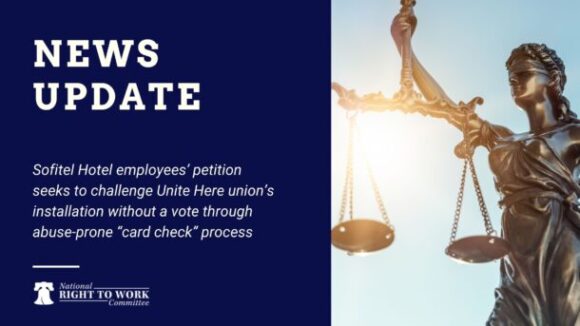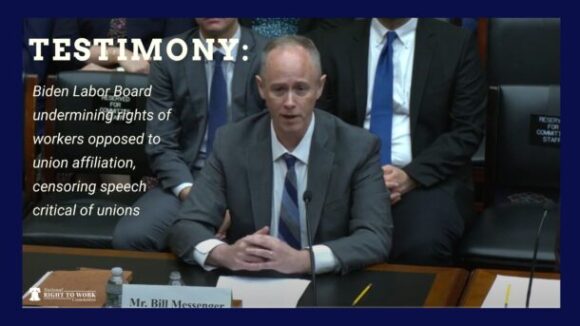Foundation Fires Back Against Biden NLRB ‘Card Check’ Mandate
Brief challenges Labor Board’s attempt to expand coercive, anti-employee organizing scheme
Big Labor’s apparent decision to drop the card check provisions from the Card Check Forced Unionism bill leaves the forced unionism provisions in the bill alive and well.
The Wall Street Journal’s take:
Politicians don’t typically broadcast their defeat, and when they do it pays to watch for the blindside hit. That’s surely the case with last week’s reports that six liberal Senators are abandoning part of labor’s top priority, “card check” legislation.
The legislation to eliminate secret ballots in union elections has in fact been comatose for weeks, since Pennsylvania’s Arlen Specter and Blanche Lincoln of Arkansas declared their opposition. So the real purpose of this “concession” is to shift to Plan B, which is to repackage most of what labor wants with new ribbons and wrapping. The bill that Senators Tom Harkin (Iowa), Mark Pryor (Arkansas), Mr. Specter and others are now considering would still give unions the whip hand in negotiations with management.
One proposal would slash the time for an organizing vote, requiring that it be held within five or 10 days after 30% of workers had signed cards asking for a union. The median time today is 38 days. Organizers want the rush because they know the more time workers have to learn about a union, the less they usually want one. Once employees hear the other side of the story, support dwindles.
This also explains a Big Labor demand to bar companies from requiring their workers to hear management’s side during a union campaign. Labor supporters say this creates a “captive audience,” but these meetings are one of management’s few opportunities to address workers, since companies are barred from the sort of outreach allowed to union organizers — such as visiting employees at home. At the same time, Senators want to give union organizers access to company property.
Democrats also aren’t giving up on binding arbitration, which would let a federal arbitrator impose a contract if management and a newly established union at a work site aren’t able to agree within 90 days. The provision would encourage unions to make maximum demands and play for time, knowing that an arbitrator could force management’s hand. Binding arbitration also denies employees a vote on a contract.
Labor is desperate to rig the bargaining rules because most workers show time and again that they don’t want a union. Americans know unions promise higher wages and benefits and more job security. But workers can also see what has happened to such highly unionized industries as steel, autos, airlines and many others. Unions couldn’t save those jobs, and in fact they contributed to their demise with contracts that made the industries uncompetitive. Most workers would also rather not hand over a chunk of their paycheck in mandatory dues to finance the political agenda of labor leaders.
Democrats and the AFL-CIO are hoping that if they dump the unpopular secret ballot ban from card check, they can get to their magic number of 60 Senators. The business community and Republicans shouldn’t be fooled and let Democrats from swing states off the hook. Card check under any cover is still a job killer.
Brief challenges Labor Board’s attempt to expand coercive, anti-employee organizing scheme

Sofitel Hotel employees’ petition seeks to challenge Unite Here union’s installation without a vote through abuse-prone “card check” process

Testimony: Biden Labor Board undermining rights of workers opposed to union affiliation, censoring speech critical of unions